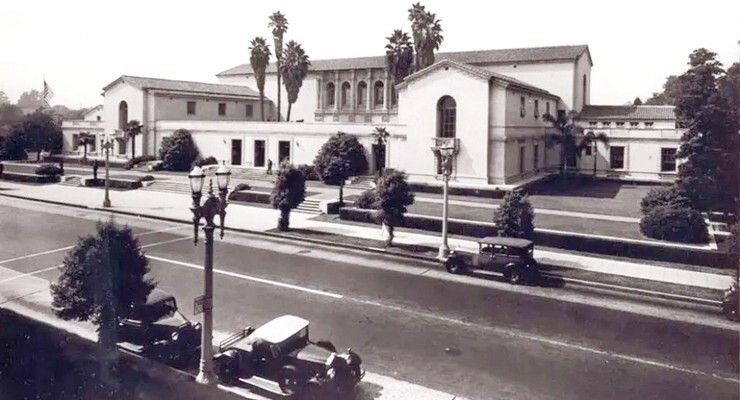
“The greatness of America,” said Rev. Martin Luther King, “is the right to protest for right.”
Pasadena is currently in the midst of an escalating controversy over that right.
More than 100 housekeepers, cooks and other workers at the Pasadena Hilton have been striking and picketing since July in their battle for a contract that includes livable wages, adequate health care benefits, fair workloads, and policies to protect workers from on-the-job sexual harassment.
In recent months, the Pasadena Police Department has detained and cited five people for protesting in front of the hotel, whose workers have been without a contract since last summer. The City Attorney has filed criminal charges against three people and considering bringing charges against the others.
They were accused of violating a city ordinance which the American Civil Liberties Union of Southern California (ACLU), as well as Local 11 of UNITE HERE, the hospitality workers union, says violates the U.S. Constitution.
On Wednesday, May 15, the ACLU sent an letter to Mayor Victor Gordo, the seven other members of the City Council, City Attorney Michele Bagneris, and Police Chief Gene Harris making the case that two provisions of the city’s law “ violate the First Amendment and Liberty of Speech Clause of the California Constitution.” The letter, signed by the ACLU Chief Counsel Peter J. Eliasberg, urges the city to “cease enforcing these provisions and repeal them from the City’s ordinances.”
On April 17, representatives from Local 11, All Saints Church, the Pasadena NAACP, the National Day Laborers Organizing Committee, Pasadenans Organizing for Progress (POP), the ACLU, and other groups met with City Attorney Michele Bagneris to urge her to drop the charges, explaining that the city’s actions not only violated the U.S. Constitution but also was an unfair interference in a labor-management dispute. The union and its community allies have also been meeting with City Council members and will address the council on Monday, May 20 to encourage them to revise the city’s law.
One of the provisions makes it unlawful to make “any noise or sound which exceeds the ambient noise level at the property line of any property by more than 5 decibels.” Another provision prohibits “any person to use any drum or other instrument or device of any kind for the purpose of attracting attention by the creation of noise within the city,” except for participants in “a school band or duly licensed parade” or where one “has been otherwise duly authorized to engage in such conduct.”
Last December, Pasadena police officers confiscated drums and handheld bullhorns from protesters supporting the Pasadena Hilton’s striking workers. In April, police officers confiscated handheld bullhorns during another rally in front of the hotel. The arraignment for the December cases is now June 3 and the arraignment for the April cases is June 12.
According to the ACLU letter, “UNITE HERE Local 11 reports that many hotel workers are afraid to use bullhorns or musical instruments during sidewalk picket line protests during labor disputes in Pasadena because they fear they will be criminally cited and prosecuted if they do so.”
“The City has been treating us like we’re criminals just because we’ve been protesting peacefully to get a living wage,” said 38-year old Milton Acevedo, who has worked at the Pasadena Hilton since 2007. “It makes us all afraid,” explained Acevedo, who was born and raised in Pasadena and attended John Muir High.
“We work so hard and just want to be paid a decent wage. But the police come in large numbers and they have filed criminal charges against some of us just for leading chants on a bullhorn,” echoed Rosa Demauro, a mother of two children who has worked as a housekeeper at the Pasadena Hilton for 27 years. “I am afraid to lead chants myself because I don’t want to face criminal charges. This is not right.”
The ACLU letter argues that the Pasadena law is unconstitutional because it is “overbroad” and thus “restricts substantially more speech than necessary” and is “so vague that it violates the Due Process Clause’s requirement of fair notice.” According to the ACLU, “The First Amendment and the Liberty of Speech Clause of the California Constitution protect the right to protest and use amplified sound on public streets and sidewalks.” As a result, “Speakers have a constitutional right to use amplified sound because, according to one federal court ruling ‘[t]he right to communicate inherently comprehends the right to communicate effectively.’” In fact, the ACLU letter says, “political speech on public sidewalks lies at the core of the First Amendment’s protections.”
Although the letter does not specifically indicate that the ACLU will sue the city over these provisions, such warnings are often a prelude to a lawsuit.
Local 11 views the Pasadena ordinance, which was passed in 2008, as a draconian prohibition on free speech.
The Pasadena Hilton workers are part of the largest hotel worker strike in modern U.S history, led by Local 11. Starting last summer, more than 10,000 Local 11 members went on strike against 60 hotels in 14 cities in Southern California, including Los Angeles, Glendale, West Hollywood, Beverly Hills, Santa Monica, Long Beach, Anaheim, Irvine, El Segundo, Costa Mesa, Dana Point, Manhattan Beach, Culver City, and Pasadena, seeking to negotiate a new contract. In each city, hotel workers and their allies carried picket signs, chanted slogans, and used bullhorns and drums in order to draw more public attention to their plight.
Pasadena is the only city that has filed criminal cases against protest participants.
Santa Monica’s noise ordinance was revised several years ago to ensure that workers and others are able to protest in front of businesses. Specifically, Santa Monica allows such protests – including the use of amplified sound – between 7 a.m. and 10 p.m. on public property that is not adjacent to residential buildings, hospitals, or schools.
The union members at 55 of those 60 hotels ended their strikes and picket lines after the hotels agreed to historic contracts. The Hyatt Place Pasadena settled its contract dispute with Local 11 last month.
But the Pasadena Hilton has resisted agreeing to a similar settlement.
These new contracts are the first since COVID devastated the tourism industry. In April 2020, more than 95% of Local 11’s members were laid off. While hotels pocketed billions in federal COVID bailout funds, unemployed hotel workers lined up at food banks. When they returned to their job after the pandemic abated, employers insisted that they do more work for less money, including cleaning more rooms every day. Wages failed to keep up with rent increases and overall inflation.
A union survey discovered that 53% of its members reported had either moved or expected to move in the near future due to rising housing costs. Many moved farther from their workplaces, resulting in hours-long commutes, as the Los Angeles Times reported. Some hotel workers had to resort to sleeping in their cars in order to get to work on time.
One of the key goals of the strike and the workers’ contract demands was for hotels to pay a living wage so employees can afford to live near where they work.
The new contract includes a $5.00 per hour wage increase in the first year of the contract — an additional $850 per month, or $10,400 a year, to pay their bills. Over the terms of the four-year contract, ending in January 2028, the housekeepers, cooks, and other workers will get a $10 an hour raise, an average 8.9% raise per year.
Housekeepers at most hotels will earn $35 per hour, or $73,000 per year, by the end of the contract. Top cooks will earn $41 per hour, or $85,000 per year. Tipped workers will earn double-time pay for working on holidays, and an automatic 20% gratuity in hotels’ full-service restaurants that will be shared by the workers.
The new contract maintains Local 11’s excellent health insurance. Workers pay no more than $20 per month for full family coverage. They also got a hefty increase in the hotels’ contribution to their pension fund, making it one of the highest- paid pension plans for service workers in the country.
A key pillar of the new contract deals with the exhausting and back-breaking work of hotel employees. It increases the number of housekeeping staff in order to reduce the number of rooms each worker has to clean each day.
The hotels also agreed in increase the diversity of their staffs, particularly the number of Black employees, who have been significantly underrepresented in the local hotel workforce. The contract also protects immigrant workers by prohibiting hotels from auditing their documents after their probationary period.
Under the new contract, hotels and restaurants agreed to work with Local 11 to purchase food products produced under United Farm Workers of America contracts. The hotels will also give preference to hiring companies with union contracts to perform construction work.
Since the region-wide hotel strike began last summer, the City of LA passed the “responsible hotel ordinance” that requires new hotels to replace housing they displaced in order to construct the new building. In November, voters in Long Beach passed the nation’s highest minimum wage for hotel workers — $29.50 an hour. Local 11, community groups, and local elected officials led that successful campaign.
But Aimbridge Hospitality – the global company that operates the Pasadena Hilton and other local hotels, including the Doubletree Hotel Downtown Los Angeles, Holiday Inn LAX, Hyatt Regency LAX, and Sheraton Park Anaheim – has so far refused to agree to a similar contract.
Based in Plano, Texas, Aimbridge Hospitality operates over 1,200 hotels in all 50 states and more than 20 countries. The company is owned by private equity firm Advent International, which has $94 billion under management. Aimbridge operates the Pasadena Hilton on behalf of the hotel’s owner, AXA Investment Managers, a Paris-based corporation that has $918 billion under management. AXA Investment Managers’ CEO Thomas Buberl made $6.5 million in 2023 – an increase of 23% over the previous year and 50% above the industry average.
Earlier this year, Local 11 launched a boycott of the controversial hotel operator, which they have dubbed “Shambridge.”
Over the last few months, three women at Aimbridge’s Sheraton Park Anaheim have come forward alleging they experienced harassment and verbal abuse at work and filed pending complaints with the California Civil Rights Department. Local 11 also pressed the company to adopt a series of specific collective bargaining proposals to address and prevent the sexual harassment of its members at Aimbridge-operated hotels.
A group of more than fifty prominent Californians, including Lieutenant Governor of California Eleni Kounalakis, State Senator Maria Elena Durazo, Dolores Huerta (co-founder of the United Farm Workers union), and the mayors of several cities, recently sent a letter to Aimbridge’s CEO Craig Smith, pressing the company to take specific steps to address the issue, including appointing an ombudsperson to provide an independent assessment of the company’s practices, recommend systemic reforms, and ensure complete and appropriate remediation in particular cases.
Peter Dreier, a longtime Pasadena resident, is a professor at Occidental College.


















